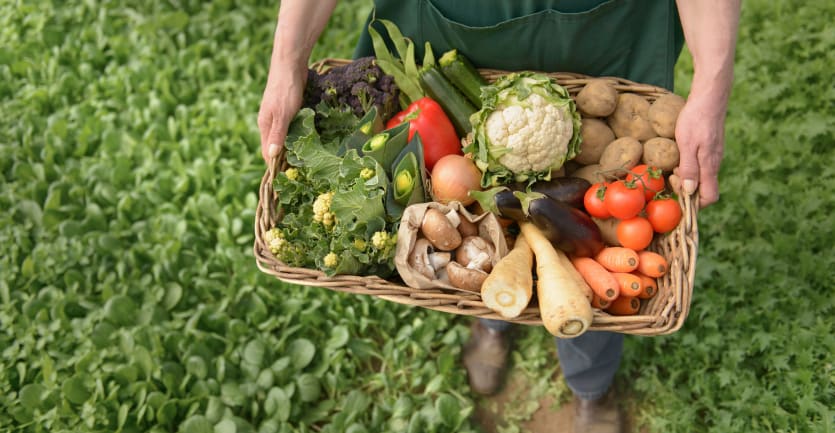In an era where health and wellness are at the forefront of many people’s minds, the importance of eating organically farmed foods has become increasingly clear. Organic farming methods prioritize sustainability, environmental health, and animal welfare, leading to numerous benefits for consumers. By choosing organic, you are not only opting for healthier options but also supporting a more sustainable food system. Here, we explore the myriad benefits of incorporating organically farmed foods into your diet.
- Nutrient-Dense and Healthier Food
One of the most compelling reasons to choose organically farmed foods is their superior nutritional profile. Studies have shown that organic foods often contain higher levels of essential vitamins, minerals, and antioxidants compared to their conventionally grown counterparts. For instance, organic fruits and vegetables tend to have higher concentrations of vitamin C, iron, magnesium, and phosphorus. Additionally, organic dairy products and meats are known to have more omega-3 fatty acids, which are crucial for heart health.
- Reduced Exposure to Harmful Chemicals
Conventional farming relies heavily on synthetic pesticides, herbicides, and fertilizers, which can leave harmful residues on food. These chemicals have been linked to a range of health issues, including hormonal disruptions, reproductive problems, and even cancer. By eating organically farmed foods, you significantly reduce your exposure to these toxic substances. Organic farming prohibits the use of synthetic pesticides and fertilizers, opting instead for natural alternatives, which makes organic foods a safer choice for you and your family.
- Better Taste and Quality
Many people who switch to organic foods report an improvement in taste and quality. This is often attributed to the farming methods used, which emphasize soil health and plant nutrition. Healthy soil produces robust, flavorful plants. Additionally, organic farming typically involves more traditional methods of crop rotation and polyculture, which can enhance the natural flavors of fruits and vegetables. Consumers often find that organic produce tastes fresher and more vibrant.
- Supports Sustainable Agriculture
Choosing organic foods supports sustainable farming practices that are designed to protect the environment. Organic farming methods reduce soil erosion, improve soil fertility, and conserve water. They also promote biodiversity and protect wildlife habitats. By avoiding synthetic chemicals and GMOs, organic farming helps maintain the ecological balance, ensuring that the land remains productive for future generations. Supporting organic farmers means investing in a food system that values long-term sustainability over short-term gains.
- Animal Welfare
Organic farming standards require that animals are treated humanely and have access to outdoor spaces. This is in stark contrast to conventional factory farming, where animals are often kept in confined, stressful conditions. Organic livestock are given organic feed, are not treated with antibiotics or synthetic hormones, and have the opportunity to engage in natural behaviors. This not only leads to healthier animals but also results in higher quality meat and dairy products.
- Lower Risk of Antibiotic Resistance
The overuse of antibiotics in conventional farming is a major contributor to the growing problem of antibiotic resistance. In organic farming, the use of antibiotics is strictly regulated and limited to instances where they are medically necessary for the health of the animal. This reduces the risk of antibiotic-resistant bacteria developing and spreading to humans, which is a significant public health concern.
- Avoidance of GMOs
Genetically Modified Organisms (GMOs) are commonly used in conventional farming to enhance crop yields and resistance to pests. However, the long-term health effects of consuming GMOs are still not fully understood, and there is growing concern about their impact on the environment. Organic farming prohibits the use of GMOs, so by choosing organic foods, you avoid the potential risks associated with genetically modified ingredients.
- Environmental Benefits
Organic farming has numerous environmental benefits. It promotes healthier soil, which is crucial for absorbing carbon dioxide and combating climate change. Organic farms typically use less energy and produce fewer greenhouse gases compared to conventional farms. Moreover, by avoiding synthetic chemicals, organic farming reduces pollution and protects water quality. Supporting organic agriculture is a proactive way to contribute to a healthier planet.
- Economic and Community Benefits
Buying organic supports local farmers and economies. Many organic farms are small, family-run businesses that rely on community support. When you purchase organic foods, you help sustain these farms and contribute to the local economy. Furthermore, organic farming practices often create more jobs than conventional methods, supporting a stronger, more resilient agricultural workforce.
- Encourages Transparency and Trust
Organic certification involves stringent standards and regular inspections, which ensure that the food you’re eating meets high quality and safety criteria. This transparency builds consumer trust and provides peace of mind knowing that organic products adhere to rigorous standards.
Conclusion
The benefits of eating organically farmed foods extend far beyond personal health. From supporting sustainable agriculture and animal welfare to protecting the environment and fostering community well-being, choosing organic is a powerful way to make a positive impact. As awareness of these benefits grows, more people are turning to organic foods to nourish themselves and the planet. By making the switch, you are not only investing in your own health but also contributing to a more sustainable and ethical food system. So next time you shop, consider going organic – it’s a choice that benefits everyone.





